- Home
- Rosamunde Pilcher
The Carousel
The Carousel Read online
The author and publisher have provided this e-book to you for your personal use only. You may not make this e-book publicly available in any way. Copyright infringement is against the law. If you believe the copy of this e-book you are reading infringes on the author’s copyright, please notify the publisher at: us.macmillanusa.com/piracy.
Contents
Title Page
Copyright Notice
Chapter 1
Chapter 2
Chapter 3
Chapter 4
Chapter 5
Chapter 6
Chapter 7
Also by Rosamunde Pilcher
The Carousel
Copyright
Chapter 1
MY MOTHER STOOD in the middle of her pretty sitting room, filled with September sunshine, and said, “Prue, you must be going out of your mind.”
She looked as though she were about to burst into tears of disappointment, but I knew that she would not, because tears would destroy her faultless maquillage, would make her face swell, turn down her mouth, and accentuate unbecoming lines. However exasperated, she would never cry. Her appearance mattered to her almost more than anything else, and now she stood across the hearth rug from me, immaculately turned out in a raspberry pink woollen suit and a white silk shirt, with her gold earrings and her charm bracelet, and pretty silvery hair crisp and curly.
She struggled, however, to contain a conflict of destructive emotions: anger, motherly concern, but mostly disappointment. I felt very sorry for her.
I said, “Oh, come on, Ma, it’s not the end of the world.” Even as I said it, it sounded pretty feeble, which it probably was.
“For the first time in your life, you seem to have got involved with a really suitable man…”
“Darling, ‘suitable’s a terribly old-fashioned word…”
“He’s charming, he’s steady, he’s got a good job, and he comes from the right sort of family. You’re twenty-three and it’s time you settled down, got married and had children and a home of your own.”
“Ma, he hasn’t even asked me to marry him.”
“Of course he hasn’t. He wants to do it properly—take you home, introduce you to his mother. There’s nothing wrong with that. And it’s obvious the way his mind is running. You only have to see the two of you together to know that he’s wildly in love with you.”
“Nigel is incapable of being wildly anything.”
“Honestly, Prue, I don’t know what you’re looking for.”
“I’m not looking for anything.”
We had had this conversation so often that I knew my part word for word, as though I had sat down and learned it by heart. “I’ve got everything I want. A job I like, a little flat of my own—”
“You can hardly call that one-room basement a flat—”
“And I don’t feel like settling down.”
“You’re twenty-three. I was nineteen when I was married.”
I nearly said, and divorced six years later, but I didn’t. However maddened by her, you couldn’t say things like that to my mother. I knew that she had a will of iron and an inner core of steel, which nearly always ensured that she got her own way, but there was something vulnerable about her—her delicate build, her enormous blue eyes, her rampant femininity—that precluded harsh words.
So I opened my mouth and then shut it again, and looked at her hopelessly. She gazed back at me, reproachful but not reproaching, and I understood for perhaps the thousandth time why my father, from the moment they set eyes on each other, had been lost. They had married because she was totally irresistible, and he was exactly what she had been searching for ever since she first realised that there was such a thing as an opposite sex.
My father is called Hugh Shackleton. In those days he worked in London, in a merchant bank in the City, with a life-style that was solid and a future that was bright. But he was basically a fish out of water. The Shackletons were a Northumberland family, and my father had been brought up there on a farm called Windyedge, where the pasture fields ran down to the cold North Sea and the winter gales blew straight in from the Ural Mountains. My father never lost his love of the country, or ceased to yearn for it. When he married my mother, the farm was being managed by his older brother, but about the time that I was five years old, this brother tragically was killed in a hunting accident. My father travelled to Northumberland for the funeral. He stayed away for five days, and by the time he returned to us, his mind was made up. He told my mother that he intended resigning from his job, selling the house in London, and returning to Windyedge.
He was going to be a farmer.
The rows and arguments, the tears and recriminations that followed this announcement are amongst the earliest of my truly unhappy memories. My mother tried everything to make him change his mind, but my father remained adamant. In the end she fired her final gun. If he returned to Northumberland, he would return alone. Rather to her surprise, he did this. Perhaps he thought that she would follow, but she could be just as stubborn. Within the year they were duly divorced. The house in Paulton Square was sold and my mother moved to another, smaller one, near Parson’s Green. I, naturally, stayed with her, but I always went to Northumberland for a couple of weeks every year, just to keep in touch with my father. After a bit he married again; a shy, horsy girl whose tweed skirts were always slightly seated and whose clear and freckled face had never known so much as the touch of a powder puff. They were very happy. They are still very happy. And I am glad.
But for my mother it was not so easy. She had married my father because he seemed to conform to a pattern of masculinity that she could understand and admire. She never delved beneath the veneer of the pinstripe suit and the briefcase. She had no wish to uncover any hidden depths. But the Shackletons were full of surprises, and to my mother’s horror, I inherited most of them. My dead uncle had not only been a farmer but an amateur musician of some achievement. My father in his spare time stitched the most beautiful tapestries. But it was their sister Phoebe who was the true rebel. An artist and an accomplished painter, she was a character of such originality, with such careless regard of day-to-day conventions, that my mother had a hard time coming to terms with her sister-in-law.
As a young woman Phoebe had based herself in London, but in her middle years she wiped the dust of the city from her shoes and went to live in Cornwall, where she cohabited happily with a charming man, a sculptor, called Chips Armitage. They never married—I think because his wife would not divorce him—and when he died he left his little Victorian Gothic house in Penmarron to Phoebe, and she had lived there ever since.
Despite this small social hiccup my mother could not completely write Phoebe off, because Phoebe was my godmother. Every now and then my mother and I would be invited to stay with her. The letters always made it perfectly clear that Phoebe would be happy to have me on my own. But my mother feared her bohemian influence, and on the principle that if she couldn’t lick the Shackletons, she would join them, she always—at least when I was a child—accompanied me on these visits.
The first time we travelled to Cornwall, I was filled with anxiety. I was only a child, but I knew well that my mother and Phoebe had nothing in common, and I dreaded two weeks of disagreements and prickly silences. But I underestimated Phoebe’s perception. She took care of the situation by introducing my mother to Mrs. Tolliver. Mrs. Tolliver lived in the White Lodge at Penmarron and had a perfectly conventional little circle of friends, who were charmed to include my pretty mother in their bridge afternoons and small dinner parties.
With them, she would contentedly play cards on the bright days while Phoebe and I walked on the beach, or set up our easels by the old seawall, or drove inland in the battered old Volkswagen that Phoebe used
as a mobile studio, to climb the moor and lose ourselves in landscapes that lay drowned in a white and shimmering light that seemed reflected from the very sea itself.
Despite my mother’s antagonism, Phoebe exerted enormous influences on my life. Unconscious influences, in the shape of my inherited talent for drawing. And other, more practical influences—pressures, maybe—which bolstered my determination to study in Florence, to go to art school, and which finally culminated in getting me my present job with the Marcus Bernstein Gallery in Cork Street.
And now it was because of Phoebe that we quarrelled. Nigel Gordon had come into my life some months ago. He was the first totally conventional person I had ever even mildly liked, and when I brought him home to meet my mother, she could not hide her delight. He was charming with her, flirting a little and bringing her flowers, and when she learned that he had invited me to Scotland to stay with his family and meet his mother, her excitement knew no bounds. She had already bought me a pair of tweed knickerbockers to wear “on the moor,” and beyond this I knew that her imagination was in full flight to the final climax of engagement notices in the Times, engraved invitations, and a London wedding with me in a white creation designed to look well from the back.
But at the last moment, Phoebe had put an end to all these pretty fancies. She had, of all things, broken her arm, and the day she returned from hospital to Holly Cottage, her little house, with the arm rigid in a plaster cast, she telephoned to beg me to come and keep her company. It wasn’t that she couldn’t perfectly well look after herself, but she was not able to drive the car, and to remain immobilized until the cast came off was more than she could bear.
As I listened to her voice over the phone, I was filled with an extraordinary sense of relief, and it was only then that I admitted to myself that I didn’t want to go north to stay with the Gordons. I was not ready to become so deeply involved with Nigel. Subconsciously I had been longing for some sound excuse to wriggle out of the arrangement. And here it was, presented to me on a plate. Without even hesitating, I told Phoebe that I would go. Then I told Nigel that I couldn’t go to Scotland. And now I was telling my mother.
She was, predictably, devastated.
“Cornwall. With Phoebe.” She made it sound like the worst sort of dead end.
“I must go, Ma.” I tried to make her smile. “You know she’s hopeless at driving that old car of hers, even with two arms.”
But she was beyond amusement. “It’s so rude, crying off at the last moment. You’ll never be invited again. And what will Nigel’s mother think?”
“I’ll write to her. I’m sure she’ll understand.”
“And with Phoebe … you’ll meet nobody with Phoebe except a lot of unwashed students and extraordinary women in hand-woven ponchos.”
“Perhaps Mrs. Tolliver will come up with some suitable man for me.”
“It’s nothing to joke about.”
I said, gently, “It is my life.”
“You’ve always said that. You said it when you took yourself off to live in that gruesome basement in Islington. Islington, of all places.”
“It’s very trendy.”
“And when you enrolled at that horrible art school…”
“At least I’ve got a perfectly respectable job. You must admit that.”
“You ought to be married. And then you wouldn’t have to have a job.”
“Even if I were married, I wouldn’t want to give it up.”
“But, Prue, it’s not a future. I want you to have a proper life.”
“I think it is a proper life.”
We eyed each other for a long moment. Then my mother sighed deeply, resigned and apparently mortally wounded. And I knew that for the time being, the argument was over.
She said, sounding pathetic, “I’ll never understand you.”
I went to give her a hug. “Don’t try,” I told her. “Just cheer up and go on liking me. I’ll send you a postcard from Cornwall.”
* * *
I had decided not to drive a car to Penmarron but to travel by train. The next morning I took a taxi to Paddington, found the right platform and the right coach. I had reserved a seat, but the train was not full; by the middle of September the flood of holidaymakers had ceased. I had just stowed my luggage and settled myself in a seat when there was a tap on the window, and I looked up and saw a man standing outside, carrying a briefcase in one hand and a bunch of flowers in the other.
It was, astonishingly, Nigel.
I got up and went back to the door and stepped down onto the platform. He was walking towards me, smiling sheepishly.
“Prue. I thought I wouldn’t find you.”
“What on earth are you doing here?”
“I came to see you off. Wish you bon voyage.” He held out the bunch of flowers, which were small and shaggy yellow chrysanthemums. “And to bring you these.”
I was, despite myself, very touched. I recognised that his coming here to the station was a generous gesture of forgiveness, and to make it clear that he had understood why I was letting him down. This had the effect of making me feel more of a heel than ever. I took the flowers in their collar of crisp white paper and buried my nose in them. They smelt delicious. I looked up at him and smiled.
“It’s ten o’clock. Oughtn’t you to be at your desk by now?”
He shook his head. “No hurry.”
“I didn’t realise you were so high up in the banking world.”
Nigel grinned. “I’m not, but I don’t exactly have to clock in. Anyway, made a phone call. Said I’d been held up.” He had a solid, mature sort of face, with fair hair beginning to thin on top, but when he grinned like that, he looked quite boyish. I began to wonder if I was mad, abandoning this personable man in order to go and nurse my unpredictable aunt Phoebe. Perhaps my mother had been right, after all.
I said, “I’m sorry about letting you down. I wrote to your mother last night.”
“Perhaps, another time…” said Nigel generously. “Anyway, keep in touch. Let me know when you get back to London.”
I knew that he would be waiting for me, if I asked him. Ready to meet my train, to drive me back to Islington, to pick up the threads of our relationship as though I had never been away.
“I’ll do that.”
“I hope your aunt recovers quickly.”
“It’s only a broken arm. She’s not ill.”
There came a short, uncomfortable pause. Then Nigel said, “Well…” He moved forward to kiss my cheek. It was more of a peck than a kiss. “Good-bye, and have a good journey.”
“Thank you for coming. Thank you for the flowers.”
He stepped back, made an indeterminate gesture of farewell, turned and walked away. I watched him go, making his way through the shifting confusion of porters, barrows, families with suitcases. At the barrier he turned back for a final time. We waved. Then he was gone. I got back into the train, stowed the flowers in the luggage rack and sat down once more. I wished that he had not come.
I was very much a Shackleton, but every now and then stray emotions would float to the surface of my mind, which I recognised as stemming straight from my mother. This was just such a time. I must be mad not to want to be with Nigel, to become involved with him, even to spend the rest of my life with him. Normally, I bucked like a horse at the very idea of settling down, but at this moment, sitting in the train, gazing out the window at Paddington Station, it suddenly seemed enormously attractive. Security; that’s what this dependable man would give me. I imagined living in his solid London house, going to Scotland for my holidays; only working if I wanted to, and not because I needed the money. I thought about having children …
A voice said, “I’m sorry, is this seat taken?”
“What…?” I looked up and saw the man standing there in the aisle between the seats. He carried a small suitcase, and there was a child beside him, a small thin girl about ten years old, dark haired and wearing round, owllike spectacles.
; “No, it’s not taken.”
He said, “Good,” and lifted the suitcase up into the rack. He did not look in the mood for any sort of pleasantry, and a certain impatience of manner made me not ask him to watch out for my bunch of chrysanthemums. He was dressed, as Nigel had been, for some City office, in a navy chalk-striped suit. But the suit sat ill upon him, as though he had lately put on a good deal of weight (I imagined enormous expense-account luncheons), and as he reached up with the suitcase, I had a direct view of his expensive, bulging shirt and straining buttons. He was dark, and once, perhaps, had been good-looking, but now his jowls were heavy, his complexion florid, and his greying hair worn long on the back of his collar, possibly to atone for the lack of it on top.
“There you are,” he said to the little girl. “Go on, sit down.”
She did so, cautiously, perched on the very edge of the seat. She carried a single comic paper and wore a red leather purse slung by a strap across one shoulder. She was a pale child, with hair cut very short, exposing a long and slender neck. This, and her spectacles, and her expression of stoic misery gave her the appearance of a small boy, and I was reminded of other small boys I had observed on station platforms, dwarfed by stiff new uniforms, fighting tears, and being told by beefy fathers how much they were going to enjoy being at boarding school.
“Got your ticket all right?”
She nodded.
“Granny’ll meet you at the junction.”
She nodded again.
“Well…” He ran a hand back over his head. He was obviously longing to be off. “That’s it, then. You’ll be all right.”
Once more she nodded. They looked, unsmiling, at each other. He began to move away and then remembered something else.
“Here…” He felt in his breast pocket, produced a crocodile wallet, a ten-pound note. “You’ll need something to eat. When it’s time, take yourself along to the restaurant car and get some lunch.”
She took the ten-pound note and sat looking at it.
“Good-bye, then.”
“Good-bye.”
He went. At the window he paused to wave and give a cursory smile. Then he disappeared, hurrying in the direction of some sleek, showy car that would restore him to the safe, masculine world of his business.

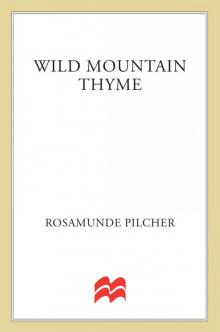 Wild Mountain Thyme
Wild Mountain Thyme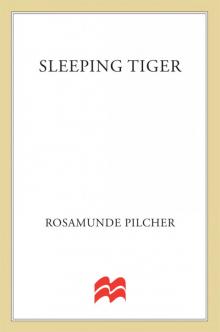 Sleeping Tiger
Sleeping Tiger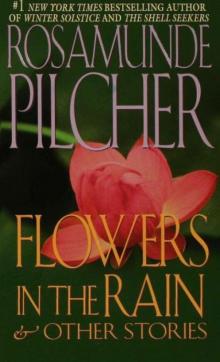 Flowers in the Rain & Other Stories
Flowers in the Rain & Other Stories September
September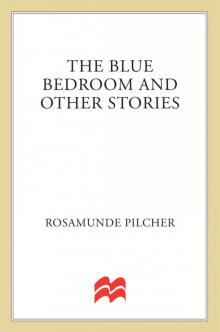 The Blue Bedroom: & Other Stories
The Blue Bedroom: & Other Stories The Carousel
The Carousel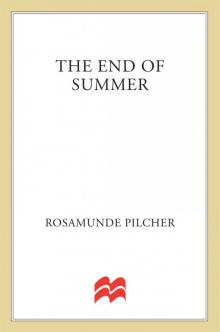 The End of Summer
The End of Summer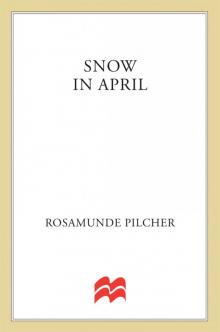 Snow in April
Snow in April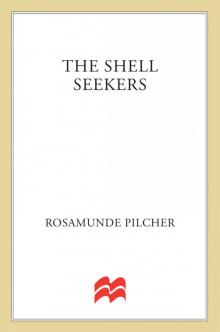 The Shell Seekers
The Shell Seekers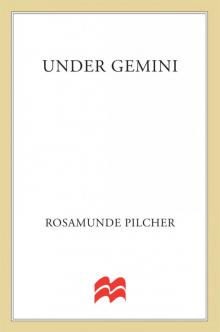 Under Gemini
Under Gemini The Empty House
The Empty House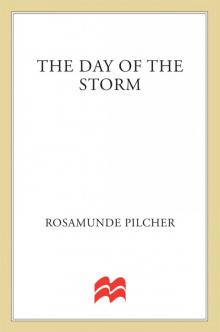 The Day of the Storm
The Day of the Storm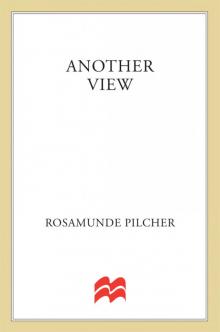 Another View
Another View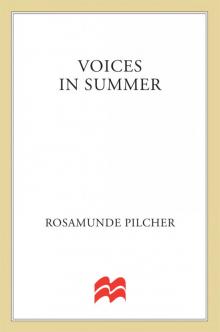 Voices in the Summer
Voices in the Summer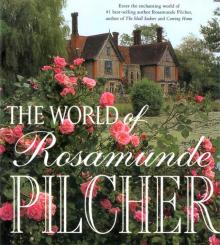 The World of Rosamunde Pilcher
The World of Rosamunde Pilcher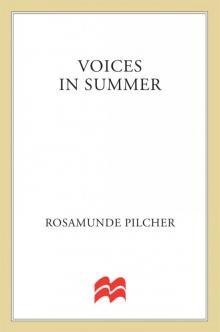 Voices In Summer
Voices In Summer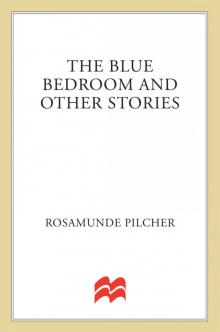 Blue Bedroom and Other Stories
Blue Bedroom and Other Stories